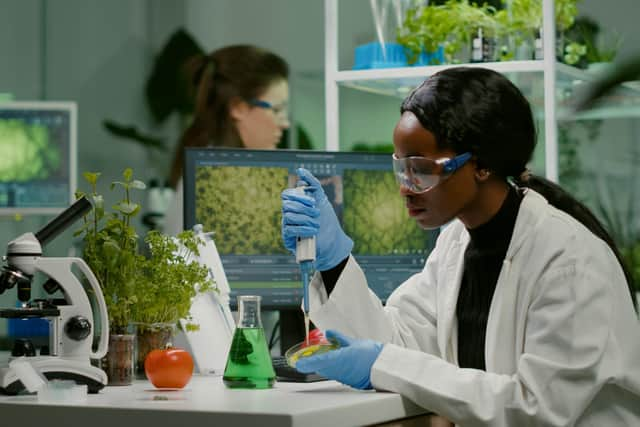Welcome to The Scotsman’s Life Sciences conference- Julie Moulsdale
This sector provides over 40,000 jobs across 700 business and higher education institutions and is predicted to reach its ambitious target of increasing turnover to £8bn by 2025. Scotland is also home to several life sciences centres of excellence, including two of the six of British Heart Foundation’s centres for cardiovascular research , while Cancer Research UK has two research bases here, developing novel drugs and diagnostic methods, including the use of precision oncology.
Life Sciences is one of just three specialist sectors for Perceptive Communicators, alongside technology and the built environment. Each of these sectors is a deliberate area of focus because of their power to improve lives and transform futures. We are fortunate to support several clients in life sciences, including Thermo Fisher Scientific whose purpose is to make the world healthier, cleaner and safer. We also work with innovative global contact lens manufacturer, Menicon, biotech champion, MiAlgae, innovation and science park, Discovery Park and Precision Medicine Scotland Innovation Centre. All of these organisations are not only making significant contributions to our economy and our environment, but also making a huge difference to our health, quality of life and life expectancy.
Advertisement
Hide AdAdvertisement
Hide AdDr David Bunton, Chief Executive Officer of Reprocell Europe and Chair at Precision Medicine Scotland Innovation Centre is one of the speakers at The Scotsman Life Sciences conference. Precision medicine’s innovative approach to medical care takes into account a patient’s individual genetic makeup and lifestyle. Treatments are tailored to the individual patient, with the aim of making these more accurate, effective and with fewer side effects. Precision medicine is seen as a game changer for healthcare and has the potential to improve care for many different diseases, including cancer, multiple sclerosis, diabetes and non-alcoholic fatty liver disease, amongst many others.


Scotland is uniquely placed to lead the charge in precision medicine. Unlike many other nations, our health data is digital and we have a fairly homogenous population, effective for large scale research. Importantly we also have the right university and research expertise, generating a highly skilled workforce and research base.
Industrial biotechnology is another key part of the life sciences sector. Biotechnology uses plant-based and waste resources to produce or process materials, chemicals and energy, much of which can be done at an industrial scale. Biotechnology provides green and sustainable alternatives to fossil fuels in everything from energy, to medicines and food packaging. Earlier this year, the Industrial Biotechnology Innovation Centre (IBioIC) launched the UK’s first Bioeconomy Week. Industrial biotechnology is predicted to be worth £1.2bn to the Scottish economy in 2025 and is a key factor in tackling climate change.
Innovative biotechnology champion, MiAlgae is a great example of this, using co-products from the whisky industry to eliminate the reliance on wild caught fish as a source of Omega-3. This harnesses the potential of microalgae as a sustainable and rich alternative source.
In a bleak economy, life sciences is a beacon of hope. Not only can this sector improve our health, it is also instrumental in the battle against climate change and while already making a significant economic contribution, has huge further economic potential. I look forward to hearing more from leaders in the industry, NHS and academia to hear about further inspirational developments to grow this life enhancing and life saving industry.
Julie Moulsdale is managing director at Perceptive Communicators
Comments
Want to join the conversation? Please or to comment on this article.